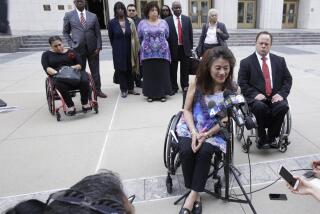Refund ‘Tracers’ Ordered to Stop
WASHINGTON — Two Southland companies have been ordered to stop suggesting they are authorized by the Department of Housing and Urban Development to help borrowers collect millions in refunds on their paid-off FHA mortgages.
Nearly 100,000 FHA borrowers--including at least 11,000 in California--are due rebates totaling more than $70 million, HUD Secretary Andrew Cuomo said at a news conference last week.
For the record:
12:00 a.m. Dec. 7, 1997 For the Record
Los Angeles Times Sunday December 7, 1997 Home Edition Real Estate Part K Page 3 Real Estate Desk 1 inches; 26 words Type of Material: Correction
FHA refunds--In the Nov. 30 story headlined “Refund ‘Tracers’ Ordered to Stop,” a Web address was incorrectly stated. The correct address is https://www.hud.gov/cgi-bin/refund2.
But they don’t need any help from individuals or businesses that suggest they are connected with either HUD or the FHA and charge people for information about how to receive their refunds, Cuomo stressed.
Yet, in what Federal Trade Commission Chairman Robert Pitofsky called the “fraud du jour,” HUD estimates that these so-called tracers collected as much as $11 million in fees in the last two years alone.
To protect consumers from paying unnecessary charges, HUD and the FTC have served cease-and-desist orders on five tracers, including the FHA/HUD Mortgage Insurance Refund Tracer of Long Beach and Pacific Associates HUD Tracer Group in Torrance.
Attempts to reach the two companies for comment were unsuccessful. FHA/HUD Mortgage’s 800 number had been disconnected; there was no listing for Pacific Associates.
“We don’t want these funds lining the pockets of scam artists,” Cuomo said. “If we owe you money, HUD will do more than ever before to find you and get you your refund.”
It is not illegal to charge a fee for helping people to locate money that may be owed them by Uncle Sam. But it is illegal for a tracer to indicate it is connected with the federal government or to tell prospects they must pay to obtain a refund.
FHA borrowers are owed refunds in two instances:
* Those who purchased a house after Sept. 1, 1983, and paid off their government-insured loans within seven years should get back a portion of the advance mortgage insurance premium they paid at closing.
* Those who purchased a house before Sept. 1, 1983, made payments for at least seven years and paid off their FHA loans before Nov. 5, 1990, are due refunds from earnings by FHA’s mortgage insurance fund.
Similar to earnings from a mutual fund and known as “distributive shares,” such refunds were halted in 1990 and are reinvested in the insurance fund.
The FHA insures about 900,000 loans a year and is diligent, Cuomo said, about contacting borrowers who are due refunds.
Some 91% of all those owed money in a given year are found and paid, HUD said. In fiscal year 1997, refunds totaling $192.9 million went to 196,842 borrowers, an average of $980 per borrower.
When the insurance is terminated by the lender, HUD’s computer system automatically generates a refund application that is mailed to the borrower’s last known address.
If there is no response, additional applications are mailed at 30-day intervals for 90 days. If there is still no response, an occupant letter is sent. If those efforts fail, HUD twice a year requests from credit bureaus the current addresses of borrowers who have not been found.
And once a year, the department sends state property offices the names of individuals from their states who have not yet claimed their refunds.
Despite these efforts, about 10% of those due refunds are not found, Cuomo said.
Some don’t leave forwarding addresses. Others change their names or are the heirs of deceased borrowers who are entitled to refunds.
But HUD plans to step up its search. It will use the Internal Revenue Service’s extensive database to locate recipients and notify them by mail that they may be entitled to refunds.
HUD also has a new toll-free telephone number, (800) 697-6967, and a new Internet site (hud.gov.cgi-bin/refund2) where people can learn whether they are due a refund by providing their names.
HUD knows the home state of about two-thirds of the 99,701 people owed $70.4 million in refunds. The largest concentration is in California, where 11,047 FHA borrowers are owed a total of $9.9 million.
More to Read
Inside the business of entertainment
The Wide Shot brings you news, analysis and insights on everything from streaming wars to production — and what it all means for the future.
You may occasionally receive promotional content from the Los Angeles Times.










